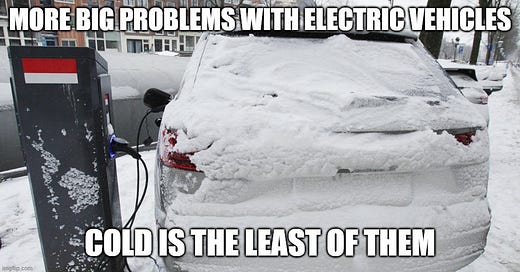We all got a good laugh during the freezing weather last month, as EV drivers struggled to find EV chargers that worked, only to discover that the charge their car received only took them a few miles. No mystery there. We have known for over a century that batteries don’t do well in cold weather, especially below zero. Now, safety problems are coming to the fore.
TOO HEAVY FOR THE ROAD: REDUCING LIFESPAN OF ROADS, BRIDGES
The extra cost of electrical vehicles vis a vie gas-powered vehicles does not end with the extra purchase price (at least 25%) nor the extra insurance premium (27%). These costs come directly out of the pockets of Americans who fell for the “EVs will save the planet” scam. I recently learned that, besides the danger that your EV can burn down your house, killing your dog & you, it presents a much greater danger to firefighters, tow truck operators, junk yards and anyone else near the smoldering wreckage. Click here to read my last EV article.
Now, we learn of yet another extra cost of driving EVs: too heavy for roads and bridges. EVs weigh up to 50% more than internal combustion motor vehicles. For example, the Ford Lightning truck weighs in at 8,240 pounds, 1,800 pounds more than the Ford F-150. The Tesla Model Y is more than 4,400 pounds while the similar size gas-powered Honda Accord is 3,300. Kia makes multiple SUVs, with the gas models weighting 3,900 pounds and the EV unit nearly 6,500.
Senator Marco Rubio, R-Florida, recently said, "EVs are typically much heavier compared to similarly sized, gas-powered vehicles, which will put additional strain on America’s transportation infrastructure. The American Society of Civil Engineers warns that an increase in EVs could substantially reduce the lifespan of roads and bridges, necessitating further investment in infrastructure."
TAKE NOTE: O’Biden’s Infrastructure Act of 2021 was not about repairing & updating America’s roads, bridges, airports et al. Indeed, only eleven percent of taxpayers’ money went to real infrastructure. The rest is being wasted on woke social programs and other transfers to our overlord’s buddies.
Residential roads are not engineered to handle the heavy weight on highways. Transportation engineers have warned that EVs will shorten the life spans of bridges by adding to the stress, wear and tear already caused by heavy commercial trucks.
Then there are those guardrails, installed to minimize damage when traffic goes awry. They are installed between lanes for traffic moving opposite directions, between lanes and edge drop-offs and more.
The guardrail concern comes out of tests conducted at a test facility in Nebraska, where examiners took a 3.6-ton Rivian R1 and sent it into a metal guardrail at 62 mph, first headon, then at an angle. Both times it "ripped through" the guardrail and continued into what would have been lanes of oncoming traffic, the report revealed. The conclusion was simple: making vehicles much heavier means "a lot more force" is required to redirect the vehicle.
University of Nebraska professor Cody Stolle, said, "We found these guardrail systems don’t have great compatibility with these [electric] vehicles yet." The heavier vehicles also will cause more damage to other vehicles in collisions. The weight provides more protection to those inside the EV, at the expense of anyone in another vehicle involved in an accident. Also, EVs are more deadly on impact with bicyclists and pedestrians.
Infrastructure problems associated with EVs will only accelerate as more drivers buy electric vehicles under the O’Biden Regime’s scheme to eliminate gas-powered vehicles and push lower-income Americans onto public transportation.
COLLAPSING PARKING GARAGES
Engineers writing recently for Structure Magazine suggested construction companies and building codes need to make accommodation for the higher weight. Parking garages, they said, should be redesigned to hold more weight.
"Significantly increasing passenger vehicle weights combined with recently reduced structural design requirements will result in reduced factors of safety and increased maintenance and repair costs for parking structures," the engineers wrote in Structure Magazine. "There are many cases of parking structure failures, and the growing demand for EVs will only increase the probability of failure."
The average weight of an electric battery is 1,000 pounds. The standard lead-acid battery for a gas-powered car weighs 25 to 60 pounds.
Electric cars and plug-in hybrids currently make up 1% of all registered vehicles. Although growth in EV sales has slowed, a record 1.2 million electric vehicles were sold in 2023, according to Kelley Blue Book. Last year, Joe Biden announced he would push for electric vehicles to make up half of all new car sales by 2030. His regime is investing in car-charging stations and providing tax incentives to increase EV purchases.
Last year’s best-selling electric car was a Tesla Model Y, which weighs 4,416 pounds on average. A gas-powered Honda Accord weighs about 3,300 pounds, and the popular Honda Civic weighs less than 2,900 pounds.
Will electric vehicles so the way of the Edsel? Let’s hope so.
Diane's Road Trip VS Jennifer Granholm's
Have you heard about the Jennifer Granholm photo op that flopped all over the internet? It revealed a key fact that the Biden Regime has been hiding: an EV charging network does NOT exist! She planned a four…






Interesting! So smart money will buy stock in asphalt producers and producers of raw ingredients…. Like high viscosity by product of “crude oil!”
And, of course, earlier replacement of roads will increase gasoline and other taxes to pay for the replacement. Everybody loses with EV’s except China!!!
All these fantastic overheads are just part of the "Climate Change" gravy train. Want to be a trillionaire? You can't just do it by starting some new business. To make real money, you must force the entire world to counterproductively replace its working energy infrastructure. They're waiting for us with their pockets open: "Understanding Climate Change - 97% of scientists agree with whoever is funding them": https://daveziffer.substack.com/p/understanding-climate-change